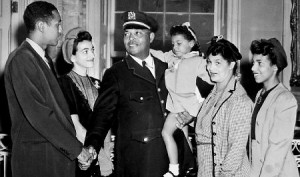Book Review: One Righteous Man: Samuel Battle and the Shattering of the Color Line in New York by Arthur Browne
 |
| Samuel J. Battle with the Honorable Fiorello LaGuardia |
The Heat From Harlem
One Righteous Man, the story of Samuel Battle, the first African-American to penetrate the thick white wall of New York's finest, is the history of race relations in the Big Apple, most specifically the neighborhood of Harlem; it's a shameful history, as one might have guessed, laying bare the insecurity, hubris, and ignorance of the non-black citizenry of New York from the fin-de-siecle through the decade of Civil Rights.
Though its author, Arthur Browne, a veteran NYC journalist (a Pulitzer winner who co-authored I, Koch), presents a microcosm of the wider world, an America of the Jim Crow South and Northern urban instability in cities like Chicago and Detroit. It is also the history of prohibition; the birth of organized crime, and the slow death of Tammany Hall. It's the tale of racism in Sport as well as the reawakening of African-American culture in literature, art, and music. Battle's story is as much an emblem of his times as the badge he wore was an emblem of protection
With this publication, Browne completes what was originally started by poet Langston Hughes. In 1952 Hughes would finally finish the draft of a biography of Battle's life which he had been commissioned to write many years earlier. But the biography never saw the light of day. Battle of Harlem was no more than a series of "vignettes" describing the highlights of the police officer's life. As Browne notes, "People enter and leave the story briefly without context. Important events are half realized". Publishers of the time would also find it difficult to market a book that told dirty truths about the contemporary prevalent racism.
 |
| In 1941, Samuel J. Battle and family at his appointment to the New York City Parole Commission |
In One Righteous Man: Samuel Battle and the Shattering of the Color Line in New York, the author seamlessly knits the experiences of Battle, who only succeeds through much perseverance and sacrifice, with the success and tribulations of many other Black pioneers. One of the more closely related tales is that of Wesley Williams, the first New York City Fireman of color. Considered a protege of Battle's, Williams was known for his tremendous physical strength and performed many heroic rescues in his time on the NYFD. He fought through imposed segregation, dangerous assignments, and constant humiliation to finally rise to the rank of Battalion Chief, overseeing a group of Captains.
On his first day on the job as a New York cop in 1911, no one talked to or ever acknowledged Battle's presence. He was called "that n***** cop" by kids on the street, he was assigned to a station house that took two hours by subway to arrive on time to work everyday. Months passed before any colleague even said a curt "good morning" to him. Little by little he broke down the barriers by not complaining and doing his job commendably. In Harlem, where he lived for many years on "Striver's Row", Battle was close with such notables as Bill "Bo Jangles" Robinson, "Sugar" Ray Robinson, and W.C. Handy.
Aside from his days on the beat, Battle worked tirelessly with fellow Equity Congress members J. Frank Wheaton and Bert Williams to create the first African-American Army regiment. The "Fifteenth ", the regiment of which Battle was dubbed "The Godfather", was formed in 1917. It spawned the future heroes Henry Johnson and Needham Roberts: two black Privates who single-handedly repelled a regiment of 24 Germans in 1918, during the Great War; this was under the flag of the French government (both were awarded the Croix de Guerre by France only to go unrecognized by the American government until Johnson was finally awarded the distinguished Service Cross in 2002).
In light of recent reports of police violence-- the flashing lights and blaring sirens of 'black and whites' with the ugly hulk of racism riding shotgun etched upon our collective consciousness-- this book is a timely one. It is indeed one that needed to be written, and cried out to be penned properly many years ago. Instead Samuel J. Battle, like the title of the last chapter in One Righteous Man, had been ruefully 'forgotten' for many years. I'm happy to report that, thanks to Arthur Browne's diligence and perspicacity, I have learned a hell of a lot more about my home town of New York, Harlem in particular, and I've been able to get to know the esteemed Samuel J. Battle (Lieut. NYPD (ret)) pretty well; as a favor, I would enjoin you all to do the same.
Comments
Post a Comment